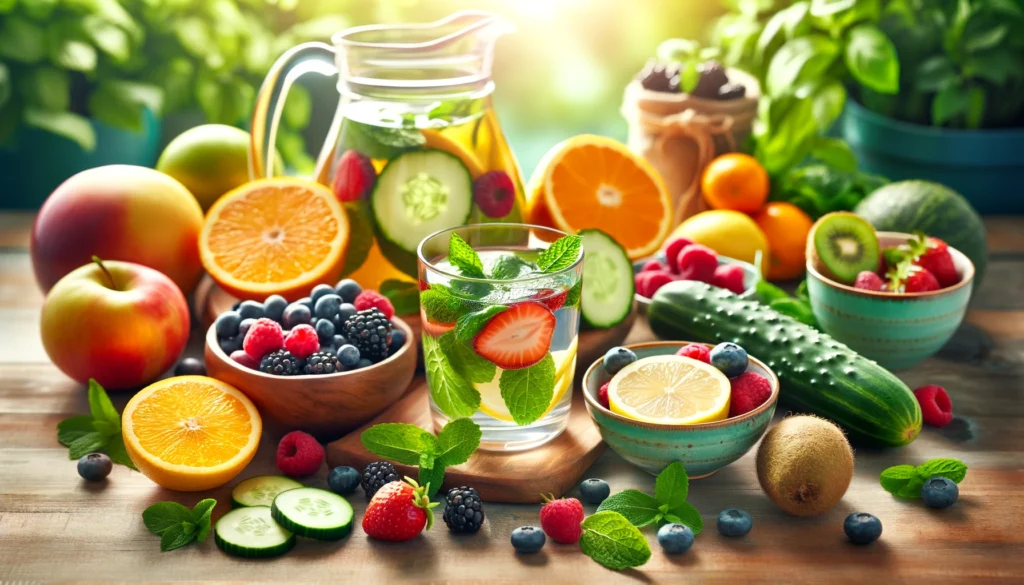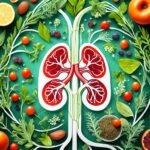In the bustling world of health and wellness, the concepts of detox and cleanse have garnered significant attention. These practices are heralded for their ability to eliminate toxins, promote health benefits, and support the body’s natural detoxification systems. But what exactly are detox and cleanse? How do they differ, and what can they offer to your health regimen?
Understanding Detox and Cleanse
At its core, detoxification refers to the process of removing harmful substances from the body. This can include a range of toxic substances, from environmental pollutants to processed foods that burden our digestive system. Detox diets and programs are designed to support the body’s natural detoxification system, helping to filter out these harmful toxins and improve liver function.
Cleansing, on the other hand, often focuses more on the digestive tract, aiming to clear out waste and promote a healthy balance of gut flora. This can involve dietary changes, the use of dietary supplements, and sometimes even colon cleansing procedures to remove waste and potentially harmful bacteria.
The Role of Diet and Lifestyle
Detox and cleanse practices often involve a diet rich in whole foods, antioxidants, and nutrients that naturally detoxify the body. Eliminating processed foods and reducing intake of certain harmful substances are key strategies in both detox and cleanse programs. These dietary changes, combined with a balanced approach to eating, can lead to sustainable weight loss, improved digestive health, and a strengthened immune system.
Health Benefits and Considerations
The health benefits of detoxing and cleansing are widely touted, ranging from weight loss and improved energy levels to a reduction in the risk of chronic diseases such as heart disease and kidney disease. However, it’s crucial to approach detox and cleanse with a balanced perspective, understanding the body’s natural ability to detoxify itself and the importance of supporting these processes through healthy lifestyle choices rather than extreme dietary restrictions.
Detox diets and cleanses can offer a reboot for your system, especially when done thoughtfully and with a focus on whole, nutrient-dense foods. However, it’s important to consult with healthcare professionals, especially in fields like complementary and integrative health, to ensure these practices are suitable for your individual health needs and conditions.
In summary, detox and cleanse practices can be valuable tools within the health and wellness space, offering ways to support the body’s natural detoxification processes, improve digestive health, and promote overall well-being. As we delve deeper into these practices, we’ll explore the specific methods, foods, and lifestyle changes that can help you detox your body safely and effectively.
The Importance of Detoxification and Cleansing in Modern Health Practices
In the ever-evolving health and wellness space, the concepts of detoxification and body cleansing have garnered significant attention. With the rise of processed foods, environmental pollutants, and sedentary lifestyles, the need to eliminate toxins from our bodies has never been more critical. Detox diets and cleanse programs promise a range of health benefits, from weight loss to improved digestive health, making them a popular choice for those looking to enhance their overall well-being.
Understanding Detox and Cleanse
Detoxification refers to the body’s natural detoxification system’s ability to remove harmful substances. These harmful substances can include toxic substances from processed foods, environmental toxins, and synthetic chemicals that accumulate in our bodies over time. Detox diets are designed to support and enhance this natural process, often by eliminating certain foods or food groups believed to contribute to toxin buildup.
Cleansing, often used interchangeably with detoxification, specifically targets the digestive system and liver function to promote the elimination of toxins. Cleanses may involve juice cleanses, detox foods, or dietary supplements that claim to flush out harmful toxins and promote health.
The Role of Diet in Detoxification
A balanced diet plays a pivotal role in supporting the body’s natural detoxification processes. Foods rich in antioxidants, whole grains, healthy fats, and sulfur-containing foods can bolster the body’s ability to detoxify naturally. Green tea, for instance, is celebrated for its nutritional benefits, including supporting liver health and aiding in the elimination of toxins from your body.
Detox programs often emphasize the importance of a diet rich in fruits, vegetables, and whole foods while advising against the consumption of processed foods and those with potentially harmful ingredients. The goal is to reduce the intake of substances that can impede the body’s natural detoxification systems and instead nourish it with components that promote health and wellness.
The Debate Around Detox Diets and Cleanses
While many advocate for the benefits of detoxification and cleansing, including weight loss and improved digestive health, skepticism exists within the complementary and integrative health community. Critics argue that most healthy bodies are fully capable of detoxifying without the need for restrictive diets or supplements. Research suggests that the body’s natural detoxification systems—the liver, kidneys, digestive system, and even the skin—are usually sufficient to remove harmful substances.
However, proponents of detox diets argue that modern lifestyles and diets can overload these natural systems, making detoxification practices beneficial. They claim that detox diets can support the body’s natural efforts, aiding in areas such as weight management, heart disease prevention, and the reduction of symptoms related to chronic diseases such as kidney disease and insulin resistance.
This introduction to detox and cleanse practices lays the groundwork for a deeper exploration into how these methods are applied, their potential benefits and risks, and how they fit into broader health and wellness strategies. As we continue, we’ll delve into specific detox diets, how to detox your body safely, and address common questions surrounding these practices.
Exploring Detox Diets and Cleanses: Methods and Efficacy
Detox diets and cleanse programs vary widely in their approaches to eliminating toxins and promoting health. Some focus on juice cleanses or fasting, while others advocate for a diet rich in specific nutrients that support the body’s detoxification processes. Understanding these methods and their potential impacts on health is crucial for anyone considering a detox or cleanse.
Types of Detox and Cleanse Programs
- Juice Cleanses: Often touted for their ability to quickly flush toxins from the body, juice cleanses involve consuming only juices from fruits and vegetables for a set period. Proponents claim they promote rapid weight loss and detoxification, but critics warn of nutritional deficiencies and short-term results.
- Detox Foods and Supplements: Some detox programs emphasize foods believed to have detoxifying properties, such as leafy greens, berries, and foods high in antioxidants. Dietary supplements may also be recommended to support the body’s natural detox systems, though their efficacy and safety can vary.
- Elimination Diets: These diets focus on removing certain foods or food groups believed to contribute to toxin buildup, such as processed foods, sugars, and sometimes dairy or gluten. The aim is to identify food sensitivities and reduce the intake of harmful substances.
Evaluating the Health Benefits
Detox diets and cleanses are often associated with a range of health benefits, from enhanced liver function and digestive health to improved energy levels and sustainable weight loss. However, it’s essential to approach these claims with a critical eye. While some individuals may experience short-term weight loss and a sense of improved well-being, the long-term health benefits of detox diets are less clear.
Research suggests that the body’s natural detoxification systems are generally effective at removing toxins, questioning the necessity of external detox programs. Moreover, the weight loss associated with detox diets may largely result from reduced calorie intake and may not be sustainable in the long term.
Safety and Considerations
Before embarking on any detox diet or cleanse, it’s crucial to consider potential risks and consult with a healthcare professional, especially for individuals with underlying health conditions such as kidney disease, heart disease, or diabetes. Some detox methods, particularly those involving drastic dietary restrictions or the use of unregulated supplements, can pose health risks. It’s also important to consider the impact of detox diets on the body’s natural detoxification systems and ensure that any program followed supports rather than hinders these processes.
Detoxification and cleansing should not be viewed as a quick fix for unhealthy habits. Instead, they can be part of a broader approach to health that includes a balanced diet, regular exercise, and a focus on foods that naturally support the body’s detoxification pathways. A healthy diet, rich in fruits, vegetables, whole grains, and lean proteins, is foundational to promoting the body’s ability to detoxify effectively and maintain overall health.
In the next section, we will delve into practical tips for safely detoxifying your body, highlight specific foods and practices that support natural detoxification, and address common myths and misconceptions about detox and cleanse programs.
Practical Tips for Safe and Effective Detoxification
Detoxification doesn’t have to involve extreme diets or costly supplements. Instead, focusing on simple, sustainable practices can support your body’s natural detoxification processes and promote long-term health and wellness. Here are practical tips to detox your body safely and effectively, along with a closer look at foods and habits that aid in the detox process.
Supporting Natural Detoxification
- Stay Hydrated: Water is essential for the body’s natural detoxification system. It aids in flushing out toxins through the kidneys and supports optimal liver function. Aim for at least 8 glasses of water a day, more if you’re active or live in a hot climate.
- Eat a Balanced Diet: Incorporate a diet rich in fruits, vegetables, whole grains, and lean proteins. These foods provide the nutrients necessary for supporting the body’s detox pathways. Antioxidant-rich foods, healthy fats, and sulfur-containing foods like garlic and onions can particularly bolster detoxification.
- Limit Processed Foods and Sugar: Reducing the intake of processed foods, sugar, and unhealthy fats can decrease the burden on your body’s detox systems. These foods often contain harmful substances and additives that can contribute to toxin buildup.
- Exercise Regularly: Physical activity increases blood circulation and promotes sweat, helping to eliminate toxins through the skin. It also boosts overall health and supports the body’s natural detoxification processes.
- Get Enough Sleep: Adequate sleep is crucial for the body’s ability to heal and detoxify. During sleep, the brain removes toxic waste byproducts that have accumulated throughout the day, supporting overall brain health and function.
Foods That Naturally Detoxify
- Leafy Greens: Spinach, kale, and other leafy greens are high in antioxidants and chlorophyll, which can help cleanse the body.
- Berries: Rich in antioxidants, berries can protect the liver and enhance its detoxifying capabilities.
- Green Tea: Known for its liver-protective properties, green tea is a great addition to a detox diet.
- Citrus Fruits: Lemons, limes, and oranges can help stimulate the liver and aid in the digestive process.
- Beets: These are high in nutrients that can improve enzyme activity and support liver health.
Addressing Common Detox Myths
While detox diets and cleanses are popular, it’s important to address common myths. For instance, the idea that the body requires external detox aids to eliminate toxins overlooks the efficiency of the body’s natural systems. Most healthy individuals have liver, kidneys, skin, and a digestive system that are fully equipped to handle detoxification without special diets or supplements.
Moreover, while some detox programs promise rapid weight loss, sustainable health improvements are best achieved through long-term lifestyle changes rather than short-term dietary interventions. It’s also critical to approach detox claims with skepticism, especially those that lack scientific backing or promote extreme dietary restrictions.
In conclusion, detoxification is an ongoing process supported by everyday healthy habits. By focusing on a balanced diet, staying hydrated, exercising, and getting enough sleep, you can help your body detoxify naturally and maintain optimal health. Always consult with a healthcare professional before starting any new diet or cleanse, especially if you have existing health conditions or concerns.
FAQs on Detox and Cleanse
How do I do a cleanse of my body?
To cleanse your body, focus on eating a balanced diet rich in fruits, vegetables, whole grains, and lean proteins. Stay hydrated, limit processed foods and sugars, and incorporate physical activity into your daily routine. Some opt for specific detox programs or juice cleanses, but it’s essential to approach these with caution and consult a healthcare professional.
Do you lose weight with a cleanse?
Many people experience short-term weight loss during a cleanse due to reduced calorie intake and fluid loss. However, for sustainable weight loss, long-term lifestyle changes and healthy eating habits are more effective.
What is a 3-day cleanse?
A 3-day cleanse typically involves a restricted diet focused on consuming detoxifying foods and beverages, such as juices, smoothies, and water, while avoiding processed foods, sugars, and fats. Its goal is to quickly rejuvenate the body’s detoxification systems.
How can I detox my body in 7 days?
Detox your body in 7 days by drinking plenty of water, eating a diet rich in fruits, vegetables, and whole grains, avoiding processed foods, exercising, and ensuring adequate sleep. These practices support the body’s natural detox processes.
What is the best drink to flush your system?
Water is the best drink to flush your system, aiding in the removal of toxins and supporting kidney function. Herbal teas, especially green tea, and lemon water are also beneficial for their detoxifying properties.
What is the difference between a cleanse and a detox?
A cleanse typically focuses on the digestive system, often through dietary changes or supplements to eliminate waste and improve digestion. A detox aims to remove toxins from the entire body, targeting various organs like the liver and kidneys through diet, exercise, and sometimes supplements.
What foods do you eat on a cleanse?
On a cleanse, you should eat foods high in fiber, antioxidants, and other nutrients that support detoxification, such as fruits, vegetables, whole grains, nuts, seeds, and lean proteins. Avoid processed foods, high-fat foods, and added sugars.
How do you cleanse your body to lose weight?
To cleanse your body and lose weight, adopt a healthy, balanced diet, reduce calorie intake, avoid processed foods and sugars, drink plenty of water, and engage in regular physical activity.
What is the fastest way to flush your body of toxins?
The fastest way to flush your body of toxins is to drink plenty of water, eat detoxifying foods, and engage in physical activities that promote sweat. Sleep and stress management are also vital.
Is a cleanse a good way to lose weight?
A cleanse can jumpstart weight loss by encouraging healthy eating habits and detoxification. However, sustainable weight loss requires long-term lifestyle changes rather than short-term dietary restrictions.
How do you make a cleansing diet?
A cleansing diet involves eating whole, nutrient-dense foods, avoiding processed foods and sugars, drinking plenty of water, and possibly incorporating specific detoxifying foods and supplements, as advised by a healthcare professional.
How can I detox my body naturally?
Detox your body naturally by maintaining a healthy diet, staying hydrated, exercising regularly, getting sufficient sleep, and minimizing exposure to toxins.
What are the 3 stages of detoxification?
The three stages of detoxification are:
- Activation: Enzymes prepare toxins for removal.
- Conjugation: Toxins are transformed into water-soluble forms.
- Elimination: Water-soluble toxins are expelled from the body through urine or feces.
What happens to your body when you start detoxing?
When you start detoxing, your body may initially react with symptoms like headaches or fatigue as it adjusts to the removal of toxins. Over time, you may experience increased energy, improved digestion, and a sense of overall well-being.
What can I drink to detox my body?
To detox your body, drink plenty of water, herbal teas, green tea, and fresh vegetable or fruit juices. These beverages support hydration and provide nutrients that aid in detoxification.
How do you know when toxins are leaving your body?
Signs that toxins are leaving your body include improved energy levels, clearer skin, better digestion, and a reduction in symptoms like bloating or headaches.
What removes toxins from the blood?
The liver and kidneys play crucial roles in removing toxins from the blood. Drinking plenty of water and eating a healthy diet support their function.
What is the 3 methods of detoxification?
The three primary methods of detoxification are dietary changes, increased physical activity, and lifestyle modifications like stress reduction and improved sleep.
How can I remove toxins from my body in 24 hours?
While it’s challenging to remove all toxins in 24 hours, drinking plenty of water, eating healthily, engaging in light exercise, and getting rest can support your body’s natural detoxification processes in a short period.
What is the best drink to detoxify your body?
Water is the best drink for detoxification, but green tea and lemon water are also excellent choices for their antioxidant properties and support for liver function.
How can I detox in one day?
Detoxing in one day involves drinking plenty of water, consuming light meals or juices rich in nutrients, engaging in gentle exercise like walking or yoga, and ensuring restful sleep.
What is the best drink to flush out toxins?
The best drink to flush out toxins is water, followed by herbal teas and fresh vegetable or fruit juices that provide hydration and essential nutrients for detoxification.
What is an example of detoxification?
An example of detoxification is consuming a diet rich in fruits, vegetables, and water for a period to support the liver and kidneys in processing and eliminating toxins.
What is the meaning of cleansing?
Cleansing refers to the process of removing toxins and waste from the body, particularly the digestive system, to promote overall health and well-being.
These FAQs offer a comprehensive overview of the detox and cleanse process, providing insights into how to approach these practices safely and effectively. Remember, while detox and cleanse programs can support health and wellness, they are most beneficial when part of a balanced lifestyle that includes a nutritious diet, regular physical activity, and adequate rest. Always consult with a healthcare professional before starting any new health regimen, especially if you have existing health conditions or concerns.







